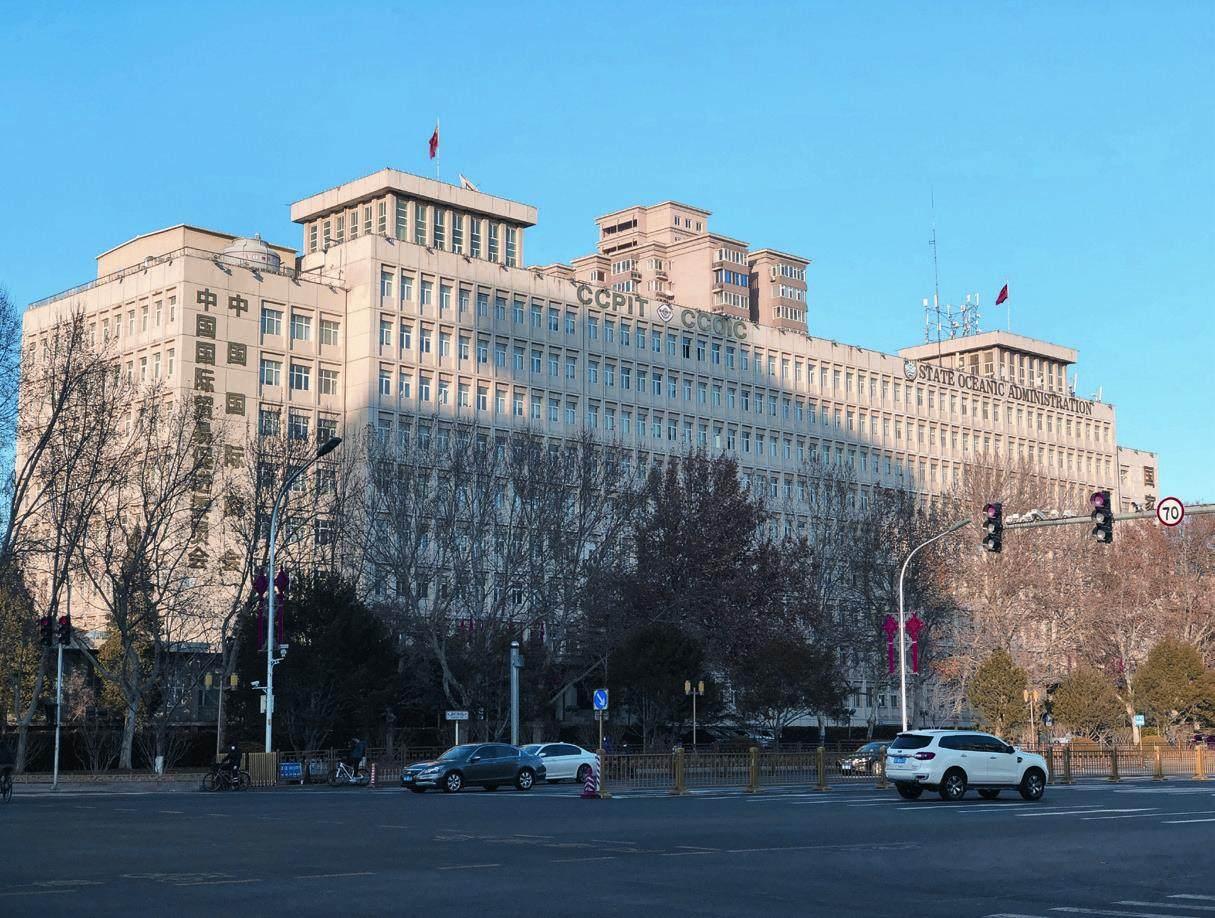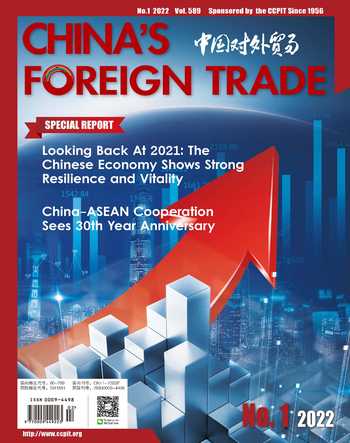CCPIT Work Meeting 2021 Is Held Virtually in Beijing


CCPIT
CCPIT Work Meeting 2021 Is Held Virtually in Beijing
The CCPIT Work Meeting 2021 was held virtually in Beijing on January 15. The meeting was guided by Xi Jinping Thought on Socialism with Chinese Characteristics for a New Era, fully implemented the spirit of the 19th National Congress of the Communist Party of China (CPC) and the 2nd, 3rd, 4th and 5th Plenary Sessions of the 19th CPC Central Committee, earnestly carried out the deployment of the Central Economic Work Conference, summarized the 2020 trade promotion work and deployed key tasks in 2021.
Gao Yan, Secretary of the Leading Party Members Group and Chairperson of CCPIT, conveyed the address and instructions of Chinese Vice Premier Hu Chunhua on the work of trade promotion and made the work report. The meeting was hosted by Lu Pengqi, member of the Leading Party Members Group and Vice Chairman of the CCPIT.
The Meeting pointed out that, faced with complicated international and domestic situations, especially with the severe impact of COVID-19 in 2020, the national trade promotion system has comprehensively implemented the requirements of the CPC Central Committee and the State Council, coordinated the disease prevention and control and the high-quality development of trade promotion work, made solid efforts to ensure “six priorities” and stability in six areas for steady economic momentum, achieved new progress and results in trade promotion, and made positive contributions to the growth of Chinas foreign trade and utilization of foreign investment despite all negative factors.
The Meeting emphasized that 2021 is the first year of the implementation of the 14th Five-Year Plan and the start of a new journey to fully build a modern socialist China. It also marks the 100th anniversary of the founding of the CPC. Thus, the trade promotion work should be based on the new development stage, follow the requirements of the new development pattern where domestic economic cycle plays a leading role while international economic cycle remains its extension and supplement, continue strengthening and improving services to enterprises, foster a favorable business environment, prepare well for the participation work of Dubai World Expo, actively participate in the reform of the global economic governance system, promote a higher level of opening-up, in order to achieve a good start of the 14th Five-Year Plan and celebrate the 100th anniversary of the founding of the party with excellent achievements.

Representatives from CCPITs branches of provinces, autonomous regions, municipalities, Xinjiang Production and Construction Corps and vice-provincial cities, sub-councils of industries, and CCPITs all departments and affiliated agencies attended the meeting at both the main venue and branch venues. Several rep- resentatives from different branches made exchanges and speeches.
International Forum on Free Trade Zones Development 2021 Was Held
On December 10, 2021, the International Forum on Free Trade Zones Development 2021 was held in Nanjing, Jiangsu Province. Gao Yan, Chairperson of the China Council for the Promotion of International Trade, Fei Gaoyun, Vice Governor of Jiangsu, Xia Xinmin, Acting Mayor of Nanjing Municipal Peoples Government, Gloria Macapagal Arroyo, Former President of the Philippines, and other guests delivered video speeches at the opening ceremony.
Gao Yan noted that free trade zones represent the highest level of openness in the world and effective carriers for countries to gather various elements and integrate them into the global market. All free trade zones should promote institutional innovation, serve for the development of enterprises and strengthen exchanges to better play their roles. The construction of pilot free trade zones is an important measure taken by China to promote the Reform and Opening-up in the new era. Since 2013, China has set up pilot free trade zones in 21 provinces, autonomous regions, and municipalities. A large number of institutional innovations have been introduced, forming an economy with a new height of openness. The CCPIT stands ready to work together with all parties to establish a more extensive cooperation mechanism, expand more multiple communication channels, build more effective service platforms, help enterprises seize opportunities of the development of free trade zones, advance openness and cooperation of global free trade zones, to make greater contributions to building an open world economy and a human community with a shared future.
FIGURES
2.2%
Chinas outbound direct investment (ODI) saw stable growth last year, rising by 2.2% year-on-year to RMB 936.69 billion, the Ministry of Commerce said.
123.6 billion
Foreign trade volume of North Chinas Inner Mongolia autonomous region reached approximately RMB 123.6 billion (USD 19.5 billion) in 2021, up 17.2% yearon-year.
8.24 billion
Chinas waterway freight and passenger volumes rose year-on-year in 2021, according to the data from the Ministry of Transport. Freight volume totaled 8.24 billion tons last year, up 8.2% from a year ago.
95%
High-speed railways will stretch to a total length of 50,000 kilometers in 2025, up from 38,000 kilometers in 2020, and 250-km ones are expected to cover 95% of cities with populations above 500,000, per the document released by the State Council.
10.3%
Chinas electricity consumption went up 10.3% year-on-year in 2021, as the countrys economy ended the year with a strong rebound despite sporadic epidemic resurgences.
19.13 trillion
In the first 11 months of 2021, national fiscal revenue surged by 12.8% from a year earlier to reach RMB 19.13 trillion.
35,128
Chinas per capita disposable income rose 9.1% year-on-year in nominal terms to reach RMB 35,128 in 2021 due to effective and potent measures aimed at safeguarding peoples livelihoods.
5.1%
The country created 12.69 million new urban jobs last year, with the surveyed urban unemployment rate standing at 5.1%, 0.5 percentage points lower than 2020.
8.11 trillion
Chinas power generation reached 8.11 trillion kilowatt-hours (kWh) in 2021, up 8.1% year-on-year, data from the National Bureau of Statistics showed.
4.4%
Investment in property development across China rose 4.4% year-onyear to reach RMB 14.76 trillion (USD 2.32 trillion) in 2021, said data published by the National Bureau of Statistics.
475,000
The International Energy Agency predicts global demand for lithium will be 40 times greater by 2040, with 475,000 metric tons of lithium produced in 2021.
110.3
The survey showed that the index tracking e-commerce logistics activities averaged 110.3 points in 2021, up 2.4% from the previous year and was close to the 2019 average.
QUOTES
China will improve the sharing of enterprise-related information from government agencies, making financing for small and medium-sized enterprises easier.
— Shang Fulin, a member of the Standing Committee of the CPPCC National Committee and Chairman of the Committee on Economic Affairs of the CPPCC National Committee
More efforts should be made to expand the economy to its full potential and maintain healthy and sustainable growth this year.
— Zhu Guangyao, former Vice-Minister of Finance
The Chinese economy is in the middle of a critical transition toward consumption upgrade and industrial transformation. Traditional drivers are being phased out while new growth drivers are still yet to be fully nurtured.
— Zhang Bin, a senior fellow at the Institute of World Economics and Politics at the Chinese Academy of Social Sciences
Chinas growth was among the fastest in major economies in the world last year.
— Ning Jizhe, Chief of the National Bureau of Statistics
More efforts should be made to expand domestic demand, strengthen the resilience of the industrial and supply chains, and guard against and defuse major risks.
— Wang Yiming, a senior economist and a member of the 13th National Committee of the Chinese Peoples Political Consultative Conference
Last year, economic operations turned out to be more complicated than expected, yet China managed to strike a good balance between achieving steady economic growth and keeping the level of inflation comparatively low.
— Jin Xiandong, Head of Policy Research at the National Development and Reform Commission
POLICIES
China Issues Plan to Promote Green Consumption
Chinese authorities unveiled a master plan on boosting green transformation of consumption in key areas, the latest move for the country to achieve its carbon peak and neutrality goals.
The plan, jointly released by the National Development and Reform Commission and six other government organs, said that green consumption modes will prevail by 2025, calling for efforts to arouse peoples awareness of green consumption, curb extravagance and waste, and enhance the market share of green and low-carbon products.
It detailed measures in various major fields, ranging from food, clothing, housing to transport, tourism and electricity.
To encourage green housing, the plan urged efforts to incorporate measures of energy saving and environmental protection while renovating old urban residential communities and rural houses.
On green transport, efforts will be made to vigorously promote the use of new energy vehicles (NEVs), such as gradually lifting the NEV purchasing restrictions, enhancing supporting facilities like battery charging and swapping stations, and increasing the application of NEV in public service vehicles.
As for shifting to green electricity consumption, the plan underlined that newly-added renewable energy and energy used as raw materials would be excluded from the cap on total energy consumption. The proportion of green electricity in residential power consumption will be raised.
Measures Focus on Stabilizing Foreign Trade as Tough Year Looms
The central government has released a new set of measures to stabilize Chinas foreign trade, a key driver of economic growth, as officials and experts expect stronger headwinds faced with the sector this year.
In a guideline published on January 11, the State Council, Chinas Cabinet, unveiled a host of measures to explore the growth potential of national imports and exports and ensure the stability and unimpeded operation of industrial and supply chains.
Key measures include amplifying the role of overseas warehousing, as financial institutions will be encouraged to bolster support of trading and logistics businesses in the development and use of overseas warehouses.
To boost the potential of consumer imports, China will optimize its cross-border e-commerce list, expand the categories of goods and host more promotional events for imported products.
The latest measures come amid expectations that export growth could slow this year following an exceptionally strong 2021.
Chinas total foreign trade hit a historic record level of USD 6.05 trillion in 2021, surging 21.4% from the year earlier, with exports up 21.2% and imports up by 21.5% year-on-year.
Li Kuiwen, a spokesman with the General Administration of Customs, told a news briefing that despite strong momentum last year, Chinas foreign trade could face more instability as it deals with challenges including dwindling demand, supply shock and weakening expectations.
Guideline Set to Regulate Nations Platform Economy
China published a slew of directives on regulating and guiding the “healthy and sustainable development” of the platform economy recently.
The 19-point notice, which was issued by nine central government organs led by the National Development and Reform Commission, highlights strengthening financial regulations on platform companies, reining in monopolistic and improper practices of internet companies, and increasing their obligations regarding taxation.
The notice defined the platform economy as “a new economic form” with internet platforms as the base and data as the driving force, which is supported by a new generation of information technology and internet infrastructure.
Recognizing the increasingly prominent role of the platform economy in Chinas social and economic development, the directive aims to “establish and improve relevant rules and regulations, and optimize the environment for the development of the platform economy”.
Investment by internet platforms in financial institutions and financial organizations should receive stricter oversight, according to the notice. Platform companies, and those who invest in them, should strictly abide by the capital and leverage ratio requirements.
Supervision of payments should be improved to cut the “inappropriate connection” between payment tools and other financial products. The country should study formulating regulations on nonbank payment services to prevent malpractices derived from abusing market dominance.
The circular also proposed revision of the countrys anti-monopoly law and improving laws related to data security and personal information protection.
- China’s foreign Trade的其它文章
- The 14th Five-Year Plan Starts A New Journey to A Modernized Socialist Country
- The Pursuit of Common Prosperity for People’s Well-being
- Moving Towards Carbon Emission Peaking and Carbon Neutrality
- China-ASEAN Cooperation Sees 30th Year Anniversary
- Twenty Years of China in the WTO:A Win Win Outcome for Both China and the World
- China Has Formally Applied to Join CPTPP

